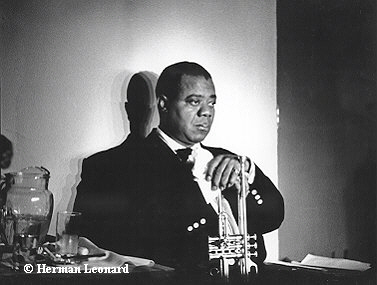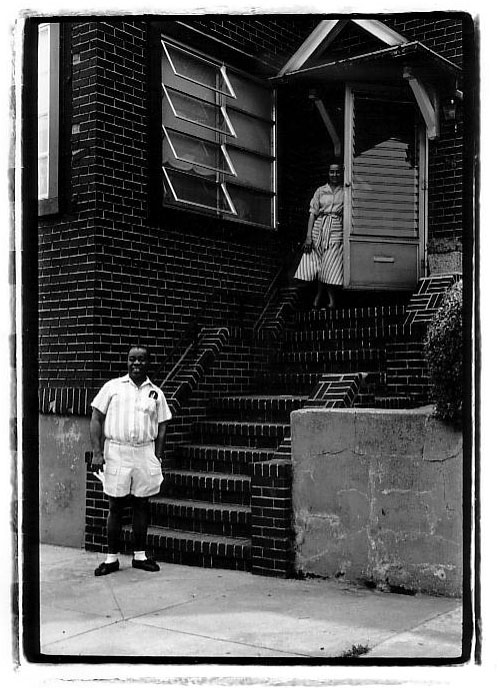 Houghton Mifflin Harcourt sent me the page proofs of Pops: A Life of Louis Armstrong last week, a few days ahead of schedule. They arrived late on Friday afternoon, meaning that I had fifteen minutes to open the box and take a peek before I had to start getting ready for a Broadway show. I started reading the proofs in earnest as soon as I got home from the theater, but duty called me away again on Saturday morning: I spent the whole day and evening at the press previews of all three installments of Alan Ayckbourn’s The Norman Conquests.
Houghton Mifflin Harcourt sent me the page proofs of Pops: A Life of Louis Armstrong last week, a few days ahead of schedule. They arrived late on Friday afternoon, meaning that I had fifteen minutes to open the box and take a peek before I had to start getting ready for a Broadway show. I started reading the proofs in earnest as soon as I got home from the theater, but duty called me away again on Saturday morning: I spent the whole day and evening at the press previews of all three installments of Alan Ayckbourn’s The Norman Conquests.
I doubt that anything less than an all-day Ayckbourn marathon would have been capable of distracting me, since I’d been waiting for months to find out what Pops would look like in page proofs. No matter how you think you feel about a book that you’ve written, your feelings are guaranteed to change when you see your treasured words set in cold type for the first time. All at once the umbilical cord that ties you to your creation is severed and you view the book as it is, not as you imagine it. It’s a near-indescribable sensation, a head-spinning mixture of pleasure and fear.
I’m relieved to say that I wasn’t disappointed in Pops. I’m sure it helped that the typographical design is elegant and readable, and I’m just as sure that I’ll pass through a few more mood swings between now and May 21, my deadline for returning the corrected page proofs to Boston. Nevertheless, I can now say with pretty fair confidence that I like both the looks and (so to speak) the sound of Pops. It reads smoothly, it seems to say everything that I wanted it to say, and the photos are fantastic.
 What next? It isn’t quite right to say that I’m now scanning the page proofs for typos, because there aren’t any. Pops was typeset directly from the copyedited text file that I sent to Houghton Mifflin Harcourt a few months ago, which had already been read with extreme care by three Armstrong experts, two of whom knew him personally. Between them, me, and Harcourt’s superbly vigilant copyeditor, I very much doubt that any misspelled words have slipped through the cracks. What I’m looking for are other kinds of slips: factual mistakes, errors of interpretation, repeated words and phrases, infelicities of expression. The first of these is by far the most important. In a perfect world, Pops would be devoid of error. I’m sure it isn’t, but I’ve gone to great lengths to get the facts of Louis Armstrong’s life absolutely straight–something that none of his previous biographers succeeded in doing–and this is my last chance to uncover any remaining blunders.
What next? It isn’t quite right to say that I’m now scanning the page proofs for typos, because there aren’t any. Pops was typeset directly from the copyedited text file that I sent to Houghton Mifflin Harcourt a few months ago, which had already been read with extreme care by three Armstrong experts, two of whom knew him personally. Between them, me, and Harcourt’s superbly vigilant copyeditor, I very much doubt that any misspelled words have slipped through the cracks. What I’m looking for are other kinds of slips: factual mistakes, errors of interpretation, repeated words and phrases, infelicities of expression. The first of these is by far the most important. In a perfect world, Pops would be devoid of error. I’m sure it isn’t, but I’ve gone to great lengths to get the facts of Louis Armstrong’s life absolutely straight–something that none of his previous biographers succeeded in doing–and this is my last chance to uncover any remaining blunders.
As of this morning I’ve read through the page proofs of Pops twice in a row. So far I’ve made a dozen or so prose-related adjustments, corrected two or three microscopically small mistakes, and caught one show-stopping goof–a repeated sentence. I also inserted two quotations from a recently published memoir by one of Armstrong’s friends that reached me a month ago. I expect that I’ll read through the proofs again, but not just yet. I need to let them cool off, which is another way of saying that I need to let myself cool off. This is no time to get nervous and trip over a shoelace. The finish line is in sight.
